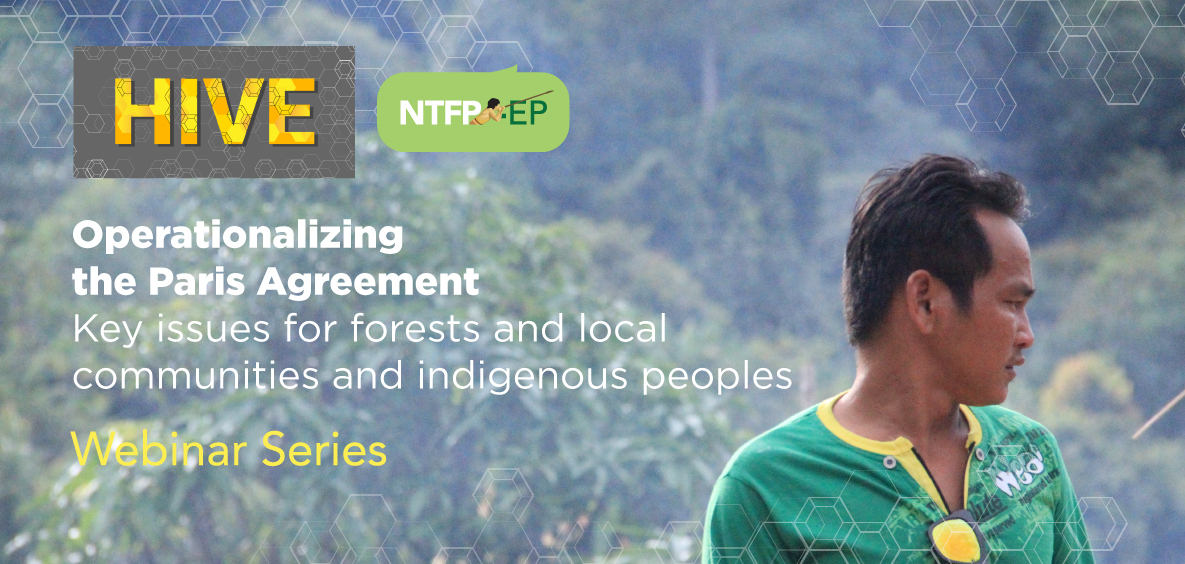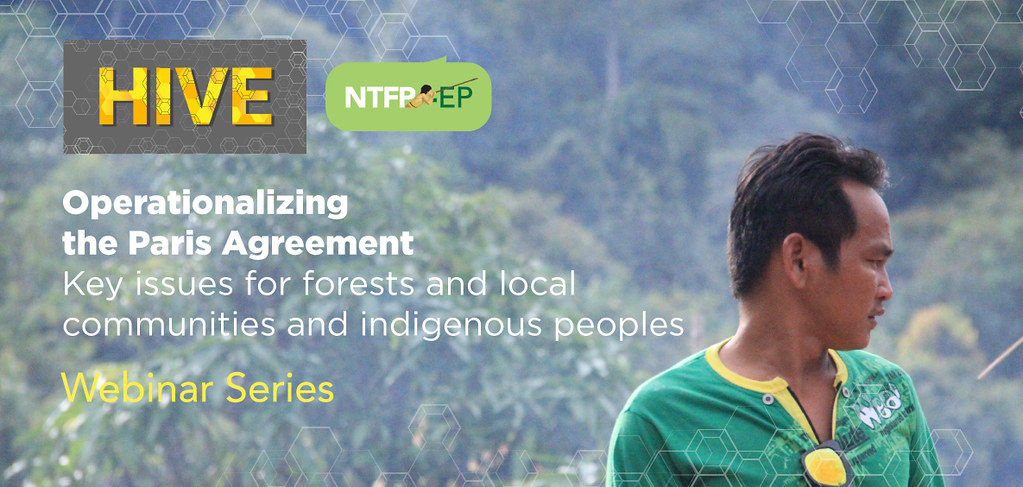MANILA, Philippines – HIVE, the NTFP-EP e-learning platform is organizing a webinar series on Local Communities and Indigenous Peoples (LCIP) Platform. Building up on discussion progressions toward COP24, this webinar explores how the LCIP can set in motion the Paris Agreement. These two-part webinars are organized by the Non-Timber Forest Products Exchange Programme – Asia in collaboration with the CSO Forum on Social Forestry In ASEAN
BACKGROUND
The LCIP Platform and the role of indigenous knowledge systems, practices and governance
Climate Change is already being felt by indigenous peoples however there are many discussions and decisions on climate change at the national, regional and global level, proven to have major implications to their life and territories, are underway. Moreover, indigenous peoples have various knowledge, systems, and practices in protecting the resources such as land, biodiversity and forests and responding to risks and changes such as climate change. All of these should be considered in discussions and decisions, which will eventually be led to government processes, planning and long terms programs affecting them.
The Twenty-third Conference of Parties (COP23) to the United Nations’ Framework Convention on Climate Change (UNFCC) in Bonn, Germany, an increasingly growing discussion on how local communities and indigenous peoples can engage in the Paris Agreement and the need to recognize their important role in climate action. Towards the end of the Conference, the parties adopted a decision[1] on the operationalization of the Local Communities and Indigenous Peoples (LCIP) Platform and further operationalization leading to COP24 in Katowice, Poland. Further, they have decided the over-all purpose of the platform which will be the following:
- To strengthen the knowledge, technologies, practices and efforts of local communities and indigenous peoples related to addressing and responding to climate change,
- To facilitate the exchange of experience and the sharing of best practices and lessons learned on mitigation and adaptation in a holistic and integrated manner, and
- To enhance the engagement of local communities and indigenous peoples in the UNFCCC process;
The year 2018 is said to be the most important year of climate talks since the Paris Agreement in 2015. Countries’ main mandate will be to agree to a set of rules and process to further operationalize the Agreement, and this so called “rulebook” must be completed and adopted by the end of this year at COP24 in Katowice, Poland.
The Paris Agreement’s rule book will provide the operational guidance for fulfilling the ambition of the Agreement and providing clarity on countries’ efforts to reach the goal. It will include details on several fronts: How countries will communicate their efforts with regards to adaptation, climate finance, transfer of technology and capacity building, and how they will be held accountable for their commitments; How collective efforts will be reviewed, leading to scaled-up actions and support every five years; and How to create a process to facilitate implementation and promote compliance.[2] In addition, one of the key aspects of the rulebook is the LCIP.
With the above-mentioned opportunities for indigenous peoples and local communities and indigenous peoples to engage in the discussion leading to the finalization of the Paris rulebook in COP24, NTFP-EP and the CSO Forum on Social Forestry recognized the importance of providing an orientation and equip its partners about the LCIP platform and current developments on the discussions leading to COP24.
OBJECTIVES
The overall objective of the webinar series is to provide an orientation to NTFP-EP partners on the Local Communities and Indigenous Peoples (LCIP) Platform.
Specifically, the webinar series aims to:
- Provide an overall introduction to the LCIP platform and discussion progress leading to COP24 in Katowice;
- Explore how the LCIP platform can enhance the engagement of local communities and indigenous peoples in the UNFCCC process; and
- Describe and discuss key takeaways from COP24, climate change related indigenous knowledge, systems and practices recognition, and how this will be facilitated by the Platform and identify possible steps moving forward
Part 1 of 2: Introduction to the LCIP Platform: How can local communities and indigenous peoples engage?
Schedule: 30 October 2018, 3:00pm – 4:00pm Philippines Standard Time (PST) (1 hour)
Register here.
This webinar will provide an introduction on the LCIP platform and what are the agreements so far in terms of participation and representation of local communities and indigenous peoples, how can this enhance the engagement of local communities and indigenous peoples in the UNFCCC process
Webinar 1 Discussion flow
| Topic | Resource Speaker | Duration |
| Overview of the Paris Agreement and what is at stake for COP24 for forestry and indigenous peoples | Edna Maguigad, NTFP-EP Asia | 10 mins |
| The LCIP platform and progress to date after the Bangkok Climate Change Conference | Mai Thin Yu Mon, Chin Human Rights Organization | 15 mins |
| Progress of NDCs, REDD-plus market and non-market approaches | Emmy Primadona, KKI Warsi | 15 mins |
| Facilitated discussion | Question and answer | 15 mins |
| Summary and wrapping-up | 5 mins |
Part 2 of 2: Moving forward post-COP24
Schedule: 2nd week of January 2019 (final date to be confirmed) 2pm – 3:30pm, Philippines Standard Time (PST) (1 hour)
Registration link (TBA)
With the conclusion of the COP 24 in Katowice, Poland, there will be several key decisions that will greatly impact local communities and IPs. The webinar will host discussions from IP representatives involved in negotiating in the Paris rulebook and the LCIP platform, and we will also have discussion on recognition of CC related IKSPs and how this will be facilitated by the platform.
[1] https://unfccc.int/resource/docs/2017/sbsta/eng/l29.pdf
[2] https://www.wri.org/blog/2016/11/insider-crafting-paris-agreements-rule-book-tasks-cop-22





